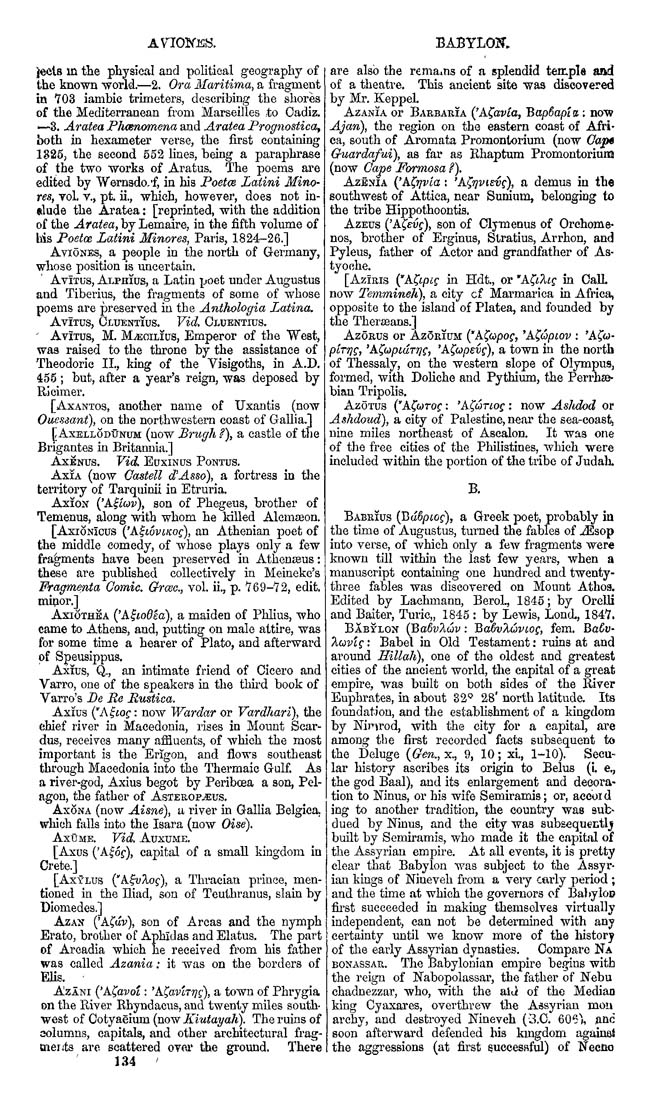AVIONICS.
BABYLOS.
Jects m the physical and political geography of
the known world.—2. Ora Maritima, a fragment
in 703 iambic trimeters, describing the shores
of the Mediterranean from Marseilles to Cadiz.
—3. Aratea Phenomena and Aratea Prognostica,
both in hexameter verse, the first containing
1325, the second 552 lines, being a paraphrase
of the two works of Aratus. The poems are
edited by Wernsdo.'f, in hia Poetas Latini Mino-
res, vol. v, pt ii, which, however, does not in-
slude the Aratea: [reprinted, with the addition
of the Aratea, by Lemaire, in the fifth volume of
his Poetoc Latini Minores, Paris, 1824-26.]
Aviones, a people in the north of Germany,
whose position is uncertain.
Avitus, Alphius, a Latin poet under Augustus
and Tiberius, the fragments of some of whose
poems are preserved in the Anthologia Latina.
Avitus, Cluentius. Vid. Cluentius.
' Avitus, M. M-eoilius, Emperor of the West,
was raised to the throne by the assistance of
Theodoric II, king of the Visigoths, in A.D.
455 ; but, after a year's reign, was deposed by
Ricimer.
[Axantos, another name of Uxantis (now
Ouessant), on the northwestern coast of Gallia.]
[Axellodunum (now Brugh ?), a castle of the
Brigantes in Britannia.]
Axenus. Vid Euxinus Pontus.
Axia (now Castell d'Asso), a fortress in the
territory of Tarquinii in Etruria.
Axion ('Ai;lav), son of Phegeus, brother of
Temenus, along with whom he killed Alcmaeon.
[Axionious ('A^wviKog), an Athenian poet of
the middle comedy, of whose plays only a few
fragments have been preserved in Athenasus:
these are published collectively in Meineke's
Fragmenta Comic. Grasc, vol. ii, p. 769-72, edit.
minor.]
Axiothea ('AfroBia), a maiden of Phlius, who
came to Athens, and, putting on male attire, was
for some time a hearer of Plato, and afterward
of Speusippus.
Axius, Q, an intimate friend of Cicero and
Varro, one of the speakers in the third book of
Varro's De Re Rustica.
Axius ("Afjoc: now Wardar or Vardhari), the
chief river in Macedonia, rises in Mount Scar-
dus, receives many affluents, of which the most
important is the Erigon, and flows southeast
through Macedonia into the Thermaic Gulf. As
a river-god, Axius begot by Peribcea a son, Pel-
agon, the father of Asteeop^eus.
Axona (now Aisne), a river in Gallia Belgica,
which falls into the Isara (now Oise).
Axume. Vid. Auxume.
[Axus ('A£<5f), capital of a small kingdom in
Crete.]
[Axylus ("AftiAoc), a Thracian prince, men¬
tioned in the Iliad, son of Teulhranus, slain by
Diomedes.]
Azan ('A&v), son of Areas and the nymph
Erato, brother of Aphidas and Elatus. The part
of Arcadia which he received from his father
was called Azania: it was on the borders of
Elis.
Azani ('A&voi : 'A&vlrng), a town of Phrygia
on the River Rhyndacus, and twenty miles south¬
west of Cotyaeium (now Kiutayah). The ruins of
columns, capitals, and other architectural frag¬
ments are scattered over the ground. There
134
are also the re mams of a splendid temple and
of a theatre. This ancient site was discovered
by Mr. Keppel.
Azania or Barbaria ('A£avla, HapBapia : now
Ajan), the region on the eastern coast of Afri¬
ca, south of Aromata Promontorium (now Cap*
Guardafui), as far as Rhaptum Promontoriura
(now Cape Formosa ?).
Azenia ('A&vla : 'Afyvievg), a demus in the
southwest of Attica, near Sunium, belonging to
the tribe Hippothoontis.
Azeus ('A&vg), son of Clymenus of Orehome-
nos, brother of Erginus, Stratius, Arrhon, and
Pyleus, father of Actor and grandfather of As-
tyoche.
[Aziris ("Afjp/c in Hdt, or "A&Xig in Call
now Temmineh), a city cf Marmarica in Africa,
opposite to the island of Platea, and founded by
the Theraeans.]
Azorus or Azorium ("Afapog, 'A^apiov : 'Afu-
plrng,' Afyspidrng, 'A^apeig), a town in the north
of Thessaly, on the western slope of Olympus,
formed, with Doliche and Pythium, the Perrhae-
bian Tripolis.
Azotus ("Afuroc: 'A^ariog: now Asltdod or
Ashdoud), a city of Palestine, near the sea-coast,
nine miles northeast of Ascalon. It wa3 one
of the free cities of the Philistines, which were
included within the portion of the tribe of Judah
B.
Babrius (BdBpiog), a Greek poet, probably in
the time of Augustus, turned the fables of Esop
into verse, of which only a few fragments were
known till within the last few years, when a
manuscript containing one hundred and twenty-
three fables was discovered on Mount Athos.
Edited by Laehmann, Berol, 1845; by Orelli
and Baiter, Turic,, 1845 : by Lewis, Lond, 1847,
Babylon (BaBvXav: TSaBvXavtog, fem. BaBv-
Xavlg: Babel in Old Testament: ruins at and
around Hillah), one of the oldest and greatest
cities of the ancient world, the capital of a great
empire, was built on both sides of the River
Euphrates, in about 32* 28' north latitude. Its
foundation, and the establishment of a kingdom
by Nimrod, with the city for a capital, are
among the first recorded facts subsequent to
the Deluge (Gen,x, 9, 10; xi, 1-10). Secu¬
lar history ascribes its origin to Belus (i. e,
the god Baal), and its enlargement and deflora¬
tion to Ninus, or his wife Semiramis; or, accord
ing to another tradition, the country was sub¬
dued by Ninus, and the city was subsequently
built by Semiramis, who made it the capital of
the Assyrian empire. At all events, it is pretty
clear that Babylon was subject to the Assyr¬
ian kings of Nineveh from a very early period;
and the time at which the governors of Babylon
first succeeded in making themselves virtually
independent, can not be determined with any
certainty until we know more of the history
of the early Assyrian dynasties. Compare Na
bonassar. The Babylonian empire begins with
the reign of Nabopolassar, the father of Nebu
chadnezzar, who, with the aid of the Median
king Cyaxares, overthrew the Assyrian mou
arcby, and destroyed Nineveh (3.C. 606), and
soon afterward defended his kingdom againsf
the aggressions (at first successful) of Necno
|








